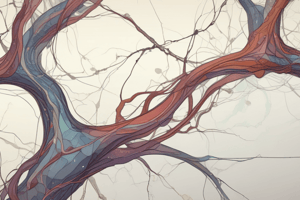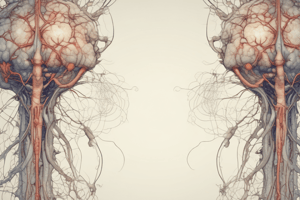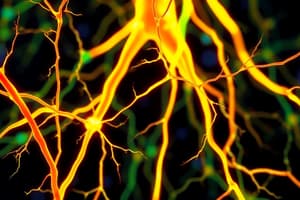Podcast
Questions and Answers
What do the axons of lower motor neurons form?
What do the axons of lower motor neurons form?
- Peripheral nerves
- Dorsal roots
- Cranial nerves
- Ventral roots (correct)
How many spinal nerves are present in humans?
How many spinal nerves are present in humans?
- 12
- 24
- 36
- 30 (correct)
Which spinal segments are responsible for the innervation of the arm muscles?
Which spinal segments are responsible for the innervation of the arm muscles?
- T1–T12
- L1–L5
- C1–C8
- C3–T1 (correct)
What type of spinal nerves contain both sensory and motor fibers?
What type of spinal nerves contain both sensory and motor fibers?
Which segment does not contribute to any spinal nerves in humans?
Which segment does not contribute to any spinal nerves in humans?
What defines the spinal segments?
What defines the spinal segments?
Which of the following correctly describes the distribution of lower motor neurons?
Which of the following correctly describes the distribution of lower motor neurons?
Which of the following pairs are correctly matched?
Which of the following pairs are correctly matched?
What is defined as the combination of one alpha motor neuron and all the muscle fibers it innervates?
What is defined as the combination of one alpha motor neuron and all the muscle fibers it innervates?
Which term refers to the collection of alpha motor neurons that innervate a single muscle?
Which term refers to the collection of alpha motor neurons that innervate a single muscle?
Why is it important to exert just the right amount of force during movements?
Why is it important to exert just the right amount of force during movements?
What happens if too much force is applied during a movement?
What happens if too much force is applied during a movement?
Which of the following statements is true about muscle contractions?
Which of the following statements is true about muscle contractions?
What does the term 'graded control' in muscle contraction refer to?
What does the term 'graded control' in muscle contraction refer to?
The actions of which type of neurons are primarily responsible for muscle contractions?
The actions of which type of neurons are primarily responsible for muscle contractions?
What could happen if too little force is applied during a movement?
What could happen if too little force is applied during a movement?
What characterizes red (dark) muscle fibers?
What characterizes red (dark) muscle fibers?
Why are fast (F) fibers more prone to fatigue compared to slow (S) fibers?
Why are fast (F) fibers more prone to fatigue compared to slow (S) fibers?
Which muscles primarily contain slow (S) fibers?
Which muscles primarily contain slow (S) fibers?
How do pale (white) muscle fibers primarily generate energy?
How do pale (white) muscle fibers primarily generate energy?
What is the primary difference in the contraction speed of slow (S) and fast (F) muscle fibers?
What is the primary difference in the contraction speed of slow (S) and fast (F) muscle fibers?
What type of muscle fibers would you expect to find in the flight muscles of birds that fly?
What type of muscle fibers would you expect to find in the flight muscles of birds that fly?
What is a common characteristic of white muscle fibers?
What is a common characteristic of white muscle fibers?
Which of the following best describes the physical appearance of dark meat in chicken?
Which of the following best describes the physical appearance of dark meat in chicken?
What is the role of gamma motor neurons in the motor system?
What is the role of gamma motor neurons in the motor system?
Which organ is primarily responsible for proprioception related to tendon tension?
Which organ is primarily responsible for proprioception related to tendon tension?
What type of input do spinal interneurons primarily provide?
What type of input do spinal interneurons primarily provide?
What aspect of proprioception is associated with joint receptors?
What aspect of proprioception is associated with joint receptors?
What is a key function of inhibitory inputs in the motor system?
What is a key function of inhibitory inputs in the motor system?
Which statement accurately describes the generation of spinal motor programs for walking?
Which statement accurately describes the generation of spinal motor programs for walking?
Which of the following best defines proprioception?
Which of the following best defines proprioception?
How did Charles Sherrington summarize the importance of the motor system?
How did Charles Sherrington summarize the importance of the motor system?
What happens to muscle fibers after prolonged inactivity?
What happens to muscle fibers after prolonged inactivity?
What is the primary cause of death in ALS patients?
What is the primary cause of death in ALS patients?
Which of the following symptoms is NOT typically associated with ALS?
Which of the following symptoms is NOT typically associated with ALS?
Who was the famous victim of ALS, known for his baseball career?
Who was the famous victim of ALS, known for his baseball career?
What is the estimated number of Americans currently diagnosed with ALS?
What is the estimated number of Americans currently diagnosed with ALS?
How quickly do ALS symptoms typically progress over time?
How quickly do ALS symptoms typically progress over time?
Which type of neuron is closely related to muscle fibers in ALS?
Which type of neuron is closely related to muscle fibers in ALS?
What is a common consequence of immobilizing joints in a cast after an injury?
What is a common consequence of immobilizing joints in a cast after an injury?
What characterizes fast fatigable (FF) muscle fibers?
What characterizes fast fatigable (FF) muscle fibers?
Which type of muscle motor unit is associated with small-diameter axons?
Which type of muscle motor unit is associated with small-diameter axons?
What type of muscle fibers are typically found in FF motor units?
What type of muscle fibers are typically found in FF motor units?
Which characteristic differentiates the alpha motor neurons of FF units from those of FR units?
Which characteristic differentiates the alpha motor neurons of FF units from those of FR units?
In how many types of motor units can muscle fibers coexist?
In how many types of motor units can muscle fibers coexist?
How do the contractions of fatigue-resistant (FR) fibers compare to those of fast fatigable (FF) fibers?
How do the contractions of fatigue-resistant (FR) fibers compare to those of fast fatigable (FF) fibers?
Which statement is true about the relationship between motor units and muscle fibers?
Which statement is true about the relationship between motor units and muscle fibers?
What feature distinguishes the motor neurons of different motor units?
What feature distinguishes the motor neurons of different motor units?
Flashcards
Motor System
Motor System
The part of the nervous system that controls muscles.
Gamma Motor Neurons
Gamma Motor Neurons
Neurons that control muscle spindle fibers.
Proprioception (Golgi Tendon Organs)
Proprioception (Golgi Tendon Organs)
Sensing the position of the body in space by detecting the tension of muscles.
Proprioception (Joints)
Proprioception (Joints)
Signup and view all the flashcards
Spinal Interneurons
Spinal Interneurons
Signup and view all the flashcards
Inhibitory Input
Inhibitory Input
Signup and view all the flashcards
Excitatory Input
Excitatory Input
Signup and view all the flashcards
Spinal Motor Programs
Spinal Motor Programs
Signup and view all the flashcards
Ventral Horn's Role
Ventral Horn's Role
Signup and view all the flashcards
Lower Motor Neuron Axons
Lower Motor Neuron Axons
Signup and view all the flashcards
Spinal Nerve Formation
Spinal Nerve Formation
Signup and view all the flashcards
Spinal Segment
Spinal Segment
Signup and view all the flashcards
Cervical (C) Segments
Cervical (C) Segments
Signup and view all the flashcards
Thoracic (T) Segments
Thoracic (T) Segments
Signup and view all the flashcards
Lumbar (L) Segments
Lumbar (L) Segments
Signup and view all the flashcards
Sacral (S) Segments
Sacral (S) Segments
Signup and view all the flashcards
Motor Unit: What Is It?
Motor Unit: What Is It?
Signup and view all the flashcards
Motor Neuron Pool: What's the Difference?
Motor Neuron Pool: What's the Difference?
Signup and view all the flashcards
Graded Control of Muscle Contraction
Graded Control of Muscle Contraction
Signup and view all the flashcards
Why Is Graded Control Important?
Why Is Graded Control Important?
Signup and view all the flashcards
Too Much Force
Too Much Force
Signup and view all the flashcards
Too Little Force
Too Little Force
Signup and view all the flashcards
What's the Relationship Between Motor Units and Force?
What's the Relationship Between Motor Units and Force?
Signup and view all the flashcards
Why is Graded Control Essential for Movement?
Why is Graded Control Essential for Movement?
Signup and view all the flashcards
What are the types of muscle fibers?
What are the types of muscle fibers?
Signup and view all the flashcards
What are slow fibers?
What are slow fibers?
Signup and view all the flashcards
Where are slow fibers found?
Where are slow fibers found?
Signup and view all the flashcards
What are fast fibers?
What are fast fibers?
Signup and view all the flashcards
What are the characteristics of fast fibers?
What are the characteristics of fast fibers?
Signup and view all the flashcards
Why are muscle fibers different?
Why are muscle fibers different?
Signup and view all the flashcards
How does muscle fiber type impact function?
How does muscle fiber type impact function?
Signup and view all the flashcards
What does the biochemistry of muscle fibers determine?
What does the biochemistry of muscle fibers determine?
Signup and view all the flashcards
Muscle Fiber Types
Muscle Fiber Types
Signup and view all the flashcards
Motor Unit
Motor Unit
Signup and view all the flashcards
Slow Motor Unit
Slow Motor Unit
Signup and view all the flashcards
Fatigue-Resistant (FR) Motor Unit
Fatigue-Resistant (FR) Motor Unit
Signup and view all the flashcards
Fast Fatigable (FF) Motor Unit
Fast Fatigable (FF) Motor Unit
Signup and view all the flashcards
Motor Neuron Size
Motor Neuron Size
Signup and view all the flashcards
Motor Neuron Axon Speed
Motor Neuron Axon Speed
Signup and view all the flashcards
Firing Properties
Firing Properties
Signup and view all the flashcards
Muscle Atrophy
Muscle Atrophy
Signup and view all the flashcards
Lower Motor Neuron
Lower Motor Neuron
Signup and view all the flashcards
ALS (Amyotrophic Lateral Sclerosis)
ALS (Amyotrophic Lateral Sclerosis)
Signup and view all the flashcards
What causes ALS?
What causes ALS?
Signup and view all the flashcards
What are the primary symptoms of ALS?
What are the primary symptoms of ALS?
Signup and view all the flashcards
Is ALS contagious?
Is ALS contagious?
Signup and view all the flashcards
What is a typical lifespan for someone with ALS?
What is a typical lifespan for someone with ALS?
Signup and view all the flashcards
Study Notes
Spinal Control of Movement
- The motor system consists of all the muscles and the neurons that control them.
- The sole executant of movement is muscle.
- Behavior requires the coordinated action of almost 700 muscles.
- The spinal cord has circuitry for coordinated movement, especially repetitive behaviors.
- Motor control can be divided into two parts:
- Spinal cord's command and control of coordinated muscle contraction
- Brain's command and control of motor programs within the spinal cord
The Somatic Motor System
- Muscles can be classified as striated or smooth
- Smooth muscle is found in the digestive tract, arteries, and is innervated by the autonomic nervous system, responsible for peristalsis and blood pressure regulation.
- Striated muscles include cardiac (heart) and skeletal muscle.
- Cardiac muscle contracts rhythmically, even without innervation. It is controlled by the autonomic nervous system.
- Skeletal muscle is found throughout the body and is responsible for movement of bones, eyes, respiration, facial expressions, and speech.
- Skeletal muscle is enclosed in tendons at the ends of the muscle.
- Each muscle fiber is innervated by a single axon from the central nervous system.
The Lower Motor Neuron
- Somatic musculature is innervated by the somatic motor neurons in the ventral horn of the spinal cord. These cells are sometimes called lower motor neurons.
- These neurons directly command muscle contraction (the final common pathway).
Segmental Organization of Lower Motor Neurons
- Axons of lower motor neurons bundle together to form ventral roots.
- Each ventral root joins with a dorsal root to form a spinal nerve that exits the cord through notches in the vertebrae.
- Spinal nerves are mixed, containing sensory and motor fibers.
- Motor neurons that supply a particular spinal nerve belong to a corresponding spinal segment (cervical, thoracic, lumbar, or sacral).
- Distribution of skeletal muscles and lower motor neurons is uneven throughout the body and the spinal cord
Alpha Motor Neurons
- Alpha motor neurons directly trigger the generation of muscle force.
- An alpha motor neuron and all the muscle fibers it innervates collectively constitute a motor unit.
- The collection of alpha motor neurons that innervates a single muscle is a motor neuron pool.
Graded Control of Muscle Contraction
- The CNS controls force of contraction by:
- Varying the firing rate of motor neurons.
- Recruiting additional synergistic motor units.
- Motor units vary in size, and are recruited based on the amount of force needed.
Muscle Fiber Structure
- Muscle fibers are formed early in fetal development by the fusion of muscle precursor cells (myoblasts), resulting in multinucleated cells.
- Each muscle fiber is enclosed in an excitable cell membrane called the sarcolemma.
- Inside the muscle fiber, there are cylindrical structures called myofibrils which contract in response to an action potential.
Muscle Contraction
- Myofibrils are divided into segments by z-lines.
- A segment is a sarcomere.
- Thin filaments slide along thick filaments.
- Myosin heads bind actin, pivot, and disengage, causing the filaments to slide.
Excitation-Contraction Coupling
- ACh is released from the axon terminals of alpha motor neurons, causing an action potential in the muscle fiber.
- The action potential triggers the release of Ca2+.
- The release of Ca2+ leads to contraction.
- Relaxation occurs when Ca2+ levels are lowered.
Myasthenia Gravis
- Myasthenia gravis is an autoimmune disease causing muscle weakness and fatigability, typically of the facial muscles.
- It's characterized by antibodies against nicotinic ACh receptors, interfering with normal actions of ACh at the neuromuscular junctions.
ALS: Glutamate, Genes, and Gehrig
- ALS is a progressive neurodegenerative disease affecting motor neurons.
- Symptoms include muscle weakness and atrophy, swallowing and breathing difficulties.
- A suspected cause is excitotoxicity (overstimulation by glutamate and other neurotransmitters).
- Several genes are associated with ALS, including defects in the enzyme superoxide dismutase.
Proprioception
- Proprioception is sensory information about where the body is positioned.
- Muscle spindles are specialized structures within skeletal muscles.
- Spindles are stretch receptors that indicate muscle length.
- Group Ia sensory axons wrap around the muscle fibers in the middle third of the spindle capsule.
- The stretch reflex causes a muscle to contract when it is stretched.
Golgi Tendon Organs
- Golgi tendon organs are strain gauges measuring muscle tension.
- They are series, not parallel.
- These proprioceptors sense and communicate muscle force information to the spinal cord.
Proprioception from the Joints
- Joints contain mechanosensitive axons that react to joint angle changes, velocity, and direction.
Spinal Interneurons
- Interneurons mediate many spinal reflexes.
- They receive input from sensory axons, descending pathways (brain), and lower motor neuron axons (collaterals).
- Interneurons can be excitatory or inhibitory, coordinating motor programs. Reciprocal inhibition is an example of how interneurons work to enable coordinated movement.
Excitatory Input
- The flexor reflex (e.g. stepping on a tack) involves coordinated activation of flexor muscles and inhibition of their antagonists.
The Generation of Spinal Motor Programs for Walking
- Central pattern generators (CPGs) are spinal circuits generating rhythmic motor activity.
- CPGs can function without brain input, even if the spinal cord is severed.
- NMDA receptors are crucial for initiating complex locomotor patterns like walking in lamprey fish.
Concluding Remarks
- Spinal cord control of movement involves intricate interactions across different levels, from biochemistry to behavior.
- Sensory feedback (like muscle spindles and Golgi tendon organs) and descending pathways from the brain influence spinal activity and motor control.
Studying That Suits You
Use AI to generate personalized quizzes and flashcards to suit your learning preferences.
Related Documents
Description
Test your knowledge on the anatomy and functions of lower motor neurons in humans. This quiz covers the spinal nerves, spinal segments, and the mechanisms of muscle innervation and contraction. Determine how these concepts apply to muscle actions and force generation during movement.




